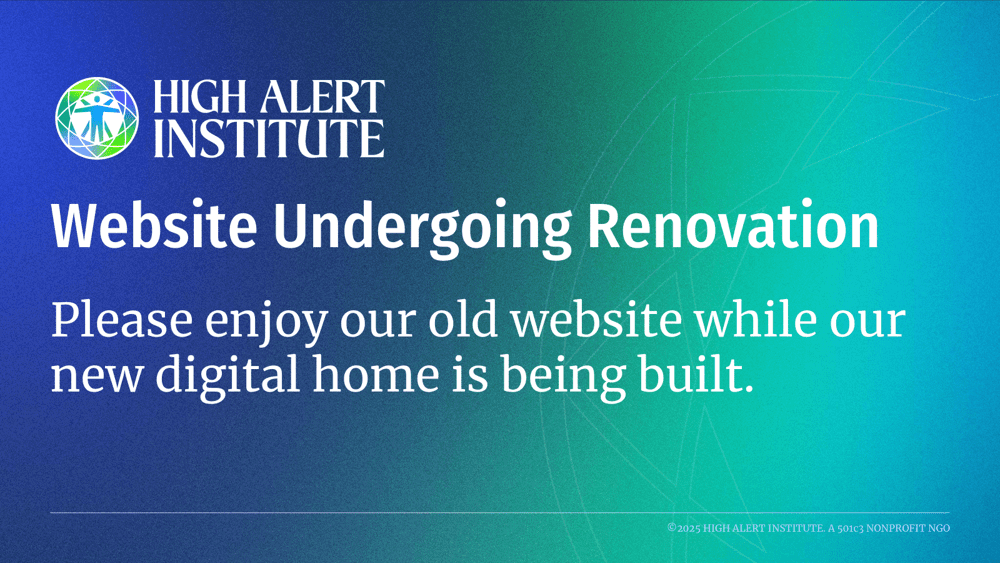High Alert Institute
The Implication of Another Round of Bombings
Many awoke this morning to the news of a major Counterterrorism success. Conspirators in London were arrested for alleged participation in an apparent plot to blow-up an unknown number of American aircraft at an uncertain date in the not too distant future, perhaps even on the anniversary of
September 11th.
My short introduction points up the very nature of terrorism and disaster preparedness. “Alleged participation” and “apparent plot” juxtaposed to phrases like “unknown number,” “uncertain date,” not too distant,” and “perhaps” emphasis the uncertainty of the information on which we must act and the need for vigilance and preparedness.
Six short weeks ago, the National Academies of Science here in the United States published 3 reports which pointed out just how unprepared America’s hospitals and healthcare industry is to deal with the type of mass carnage thwarted today or the catastrophe that was hurricane Katrina.
I am among that group of disaster response experts who lost colleagues and family when the towers fell. It is infuriating to know that five years later we who prepare the nation must still argue with corporations and healthcare institutions before they take responsibility for their part in our nation’s safety, security, and preparedness. Those who teach these most critical skills remind our students that the goal is not to pass a test or gain career advancement. The goal is to go home alive at the end of the day.
On those occasions when corporations and healthcare institutions bring in “the experts,” it is discouraging to see the room more than half empty. In a nation whose businesses pride themselves on customer care, to see so few people interested in preserving the nation’s safety is demoralizing beyond words.
Equally disturbing is the recent trend towards territorialism among medical specialties. Since 9/11, every specialty has sought to proclaim itself the “Masters of Disaster”. They fail to realize that most of the healthcare delivered after a disaster is simply the daily practice of medicine in more austere of conditions. They also fail to understand that the majority of disaster medicine is practiced before disaster ever strikes. Disaster Medicine specialists are essential to the integration of healthcare into the community disaster response, and the elimination of profession-specific silos of authority and knowledge. What these other specialties fail to see is that in the planning, preparation, response and recovery from disaster, the healthcare community must be a seamless team, not a collection of egocentric individuals. Rather than embracing the concept of board certification in the new specialty of Disaster Medicine, these territorial and fractious groups seek to stake their claim in this most critical part of our brave new world. In short, they have learned nothing over the last five years.
There is encouraging news. Disaster Life support (DLS) has become the de facto national standard for disaster preparedness of individuals, families, businesses and healthcare professionals and Healthcare First Responder training (HFR) has become the ruler by which hospitals and other healthcare institutions are measured. It is immensely rewarding when participants “catch the bug” and understand how important it is to be prepared to protect themselves, their families, their communities, and their patients. Much like the early days of CPR, it will take time for the nation to understand the importance of every man, woman and child knowing what to do when the wind blows, the buildings falls or the whole planet sneezes at once. Until then, those who teach these most precious skills will continue to strive to ensure that everyone goes home at the end of the day.
High Alert Institute
4800 Ben Hill Trail
Lake Wales, FL 33898
Office: 863.696.8090
FAX: 407.434.0804
EIN: 27-5078437
Info@HighAlertInstitute.org
Privacy Policy
Cookie Policy
Terms of Use
Disclaimers
Get Your Data
Shipping Policy
Message Us
Transparency
Registrations
Do Not Sell Info
Return Policy
A COPY OF THE OFFICIAL REGISTRATION AND FINANCIAL INFORMATION MAY BE OBTAINED FROM THE DIVISION OF CONSUMER SERVICES BY CALLING TOLL-FREE, WITHIN THE STATE, 1-800-435-7352 (800-HELP-FLA), OR VISITING www.FloridaConsumerHelp.com. REGISTRATION DOES NOT IMPLY ENDORSEMENT, APPROVAL, OR RECOMMENDATION BY THE STATE. Florida Registration #CH68959
REGISTRATION WITH A STATE AGENCY DOES NOT CONSTITUTE OR IMPLY ENDORSEMENT, APPROVAL OR RECOMMENDATION BY THAT STATE.










